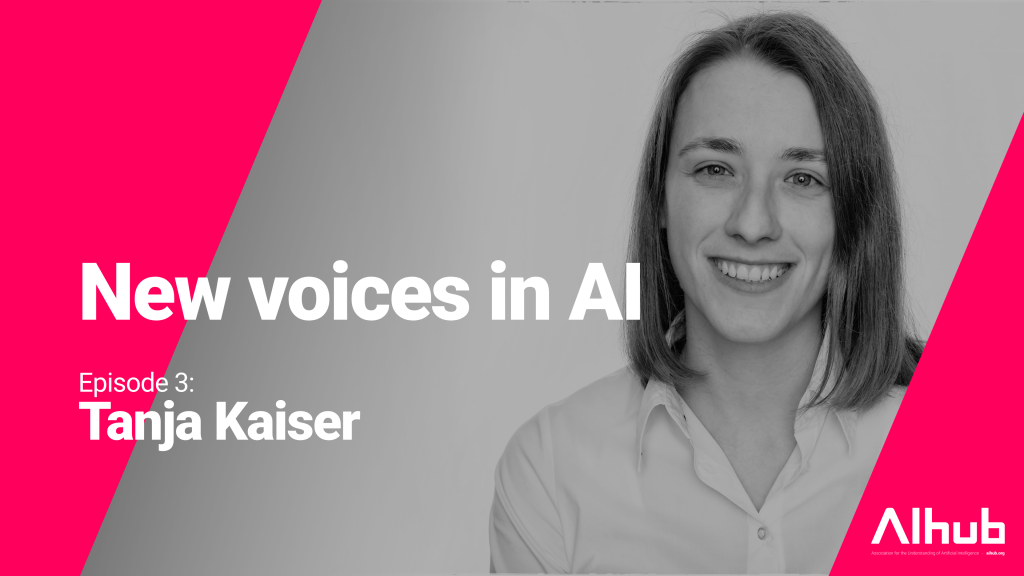
ΑΙhub.org
New voices in AI: Tanja Kaiser

Welcome to the third episode of New voices in AI!
This episode features Tanja Kaiser sharing her journey to working with swarm robotics. All episodes of New voices in AI are available here here
Who are you? Where are you from/ where do you work?
I’m Tanja Katharina Kaiser and I’m currently a research assistant and final year doctoral candidate in the Service Robotics Group led by Prof. Dr.-Ing. Heiko Hamann at the Universität zu Lübeck, Germany. My current research focus is on evolutionary swarm robotics, but I am interested in swarm intelligence and bio-inspired robotics in general. I hold a bachelor’s degree in applied computer science from the Baden-Wuerttemberg Cooperative State University Stuttgart, Germany, and a master’s degree in computer science from the Technische Universität Berlin, Germany.
How did you get into AI?
Back in my school days, I didn’t imagine becoming a roboticist or an AI researcher. But I’ve always been interested in technology and a variety of other things. I joined my school’s multimedia and science clubs, and my favorite subjects were physics and literature. When choosing my course of studies, I wanted to do something more applied than pure physics and ended up studying computer science. During my bachelor’s studies, I found the most exciting lectures were about technological approaches that are inspired by other fields of research, such as biology or psychology. Additionally, I developed an interest in robotics, which wasn’t in my curriculum. So I decided to focus on intelligent systems, including AI, in my master’s program. And from there, it was only a small step to becoming a swarm robotics researcher.
What are you working on currently?
My current research focuses on automatically generating controllers for robot swarms. The manual implementation of such controllers is challenging because it requires guessing what behavior of individual swarm members will lead to the desired behavior of the swarm as a whole. Automatically generating the swarm robot controllers avoids this challenge, but a suitable reward to drive the optimization process has to be defined.
In my research, I explore the minimize surprise approach in detail, which was first published by my doctoral supervisor Prof. Dr.-Ing. Heiko Hamann in 2014. We optimize controllers using simple evolutionary algorithms. But instead of rewarding a specific task, we reward that robots are good at predicting the state of their environment in the next time step. Robots have two options to improve their predictions: they can improve their internal world model, or they can adjust their behavior to match their world model. This gives the evolutionary algorithm the freedom to come up with a variety of collective behaviors. Using our minimize surprise approach in simulation and with swarms of real robots, we were able to generate controllers for several swarm behaviors, such as aggregation, dispersion, self-assembly, collective construction, and collective decision-making.
Next to my main research, I am working with a small team of students on the implementation of ROS2swarm, a ROS 2 package for swarm behaviors. It is a modular and easily extensible framework that provides a library of ready-to-use swarm behaviors.
What excites you about your work?
Most exciting is that my research is very multifaceted, since it is greatly inspired by nature. Evolutionary algorithms mimic natural evolution, rewards sometimes draw on concepts from other research fields, such as neuroscience, and swarm robotics is inspired by the swarm behavior of animals, such as ants, bees, or birds. This allows me to learn a lot about topics that go beyond my background as a computer scientist and to constantly broaden my horizons.
What is it about your specific sub-field you find interesting or intriguing?
When we think of intelligence and solving complex tasks, humans usually come to mind. But we tend to overlook the tiny creatures around us, such as bees or ants, that can accomplish a lot as a collective. The fact that we can draw inspiration from such natural swarms to have groups of simple robots solve complex tasks is what I find most fascinating about my field of research.
What would you like to ask the next interviewee?
Which aspects of your daily life inspire your AI research?
Where can people find out more?
A complete list of my publications is on Google Scholar, and I post about my research and more on Twitter (@msminirobot).
tags: #newvoicesinAI










